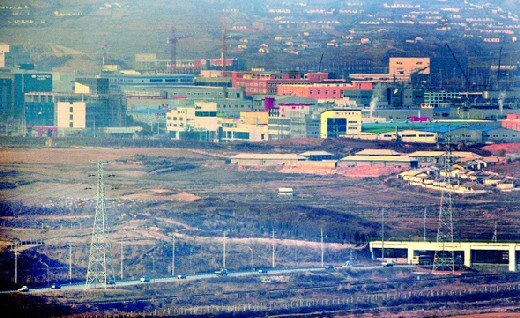hankyoreh
Links to other country sites 다른 나라 사이트 링크
[Analysis] N. Korea’s actions read like an ultimatum for the South

North Korea has taken a series of unexpected, intense steps on November 24 with regard to the Gaeseong (Kaesong) inter-Korean cooperation project.
North Korea has virtually incapacitated the Gaeseong Industrial Complex, a core inter-Korean cooperation project, by demanding South Korea withdraw government employees and businesspeople based at the complex by December 1, excluding essential personnel needed to manage the industrial park. The move was seen as the greatest amount of pressure that could be placed on South Korea without closing the complex completely, which would deal a severe political and diplomatic blow to both North and South.
North Korea’s action is very strong. If the current situation becomes protracted, the Gaeseong Industrial Complex will be in danger of losing its viability. It is likely that the North, having done all it can without closing the complex, will now wait for a reaction from the South.
The announcement that North Korea will restrict passage across the Military Demarcation Line except for a limited amount of business related to the Gaeseong Industrial Complex follows a series of previous warnings, only this time the North appears to be serious about making sure that its warnings are more than empty words. On November 12, the North Korean military said in a message, “North-South relations are at a serious crossroads of full-scale closures.” On November 22, a spokesperson for the North’s Committee for the Peaceful Reunification of the Fatherland said Pyongyang “will sternly deal with the South’s actions as we have already declared.” These messages seem to be indicating that unless South Korea changes its N. Korea policy, the North will close the Gaeseong Industrial Complex and then completely cut off inter-Korean relations. The November 24 announcement was close to an ultimatum for President Lee Myung-bak, indicating that he must choose between ”confrontation” and “dialogue” as Pyongyang appears to have no intention of prolonging the current state of inter-Korean relations.
The North’s action was also seen as a comprehensive and strategic step that will have an affect on inter-Korean relations, the six-party talks and North Korea-U.S. ties. Kim Geun-sik, a professor of politics and diplomacy at Kyungnam University, said, “From the North’s point of view, now is the right time to reinforce its pressure on the South.” North Korea seems to have taken the tougher measure against the South because of the recent announcement that the six-party talks would resume on December 8, and it may feel that it would be difficult to hold high-level discussions with the United States while U.S. President-elect Barack Obama is in the process of taking over the U.S. administration.
Another possibility is that North Korea may feel it is necessary to lay the groundwork needed to improve relations with the United States, efforts which could then continue after the Obama administration is inaugurated. Kim Seong-bae, a senior researcher at the Institute for National Security Strategy, said, “If North Korea and the United States want to forge a major agreement in the future, the current strained relationship with the South will be a burden for the North. Resolving the current situation by putting intense pressure on the South sends a contradictory message.”
Many experts have agreed that the only practical way to bring about a thaw in inter-Korean relations is to hold a meeting with special envoys from South and North Korea. However, they also pointed out the possibility that President Lee may not send an envoy to the North anytime soon. Professor Yang Moo-jin of the University of North Korean Studies, said, “If inter-Korean ties are severed, it will cost an enormous amount to restore them. The cost will be paid with great sacrifice. The leaders will have to seriously consider that.”
Please direct questions or comments to [englishhani@hani.co.kr]
Editorial・opinion
![[Column] Has Korea, too, crossed the Rubicon on China? [Column] Has Korea, too, crossed the Rubicon on China?](https://flexible.img.hani.co.kr/flexible/normal/500/300/imgdb/original/2024/0419/9317135153409185.jpg) [Column] Has Korea, too, crossed the Rubicon on China?
[Column] Has Korea, too, crossed the Rubicon on China?![[Correspondent’s column] In Japan’s alliance with US, echoes of its past alliances with UK [Correspondent’s column] In Japan’s alliance with US, echoes of its past alliances with UK](https://flexible.img.hani.co.kr/flexible/normal/500/300/imgdb/original/2024/0419/2317135166563519.jpg) [Correspondent’s column] In Japan’s alliance with US, echoes of its past alliances with UK
[Correspondent’s column] In Japan’s alliance with US, echoes of its past alliances with UK- [Editorial] Does Yoon think the Korean public is wrong?
- [Editorial] As it bolsters its alliance with US, Japan must be accountable for past
- [Guest essay] Amending the Constitution is Yoon’s key to leaving office in public’s good graces
- [Editorial] 10 years on, lessons of Sewol tragedy must never be forgotten
- [Column] A death blow to Korea’s prosecutor politics
- [Correspondent’s column] The US and the end of Japanese pacifism
- [Guest essay] How Korea turned its trainee doctors into monsters
- [Guest essay] As someone who helped forge Seoul-Moscow ties, their status today troubles me
Most viewed articles
- 1[Column] The clock is ticking for Korea’s first lady
- 2Hong Se-hwa, voice for tolerance whose memoir of exile touched a chord, dies at 76
- 3After 2 months of delayed, denied medical care, Koreans worry worst may be yet to come
- 4[Column] Has Korea, too, crossed the Rubicon on China?
- 5US overtakes China as Korea’s top export market, prompting trade sanction jitters
- 6Samsung barricades office as unionized workers strike for better conditions
- 7[Correspondent’s column] In Japan’s alliance with US, echoes of its past alliances with UK
- 8All eyes on Xiaomi after it pulls off EV that Apple couldn’t
- 9[Correspondent’s column] The US and the end of Japanese pacifism
- 10[Guest essay] How Korea turned its trainee doctors into monsters